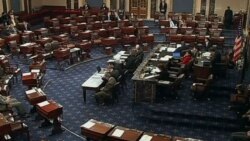WASHINGTON —
The partisan polarization and political dysfunction on display during the recent “fiscal cliff” budget negotiations have left many people pessimistic about the U.S. democratic system’s ability to function and by what seems to be a perpetual state of gridlock in Washington.
Many visitors to the U.S. Capitol, like David Stark from the state of nearby Maryland, come to admire this monument to democracy but express frustration with the political polarization inside its halls.
“You know, I wish there was more of a centrist faction that people were willing to kind of buck their party leaders and be together,” said Stark.
While Congress and President Barack Obama were able to reach a deal to avert the “fiscal cliff” deadline - which would have imposed drastic spending cuts and steep tax increases - the process highlighted politicians' inability to work together.
Negotiations broke down between Obama, a Democrat, and the Republican Speaker of the House of Representatives, John Boehner. Democratic and Republican leaders in the Senate also failed to agree.
Congressional scholar Thomas Mann, with The Brookings Institution, said the gridlock is partly a structural problem caused by divisive party politics that often blocks cooperation between the branches of government.
“Our political parties, which were never anticipated by the framers and built into the constitution, have evolved in a way that they don’t fit well with our governing system,” said Mann.
In the end, it was the personal relationship between Vice President Joe Biden, a former senator, and Senate Minority Leader Mitch McConnell that overcame the deep divide. And the bill that passed during a special session of Congress on New Year’s Day only postponed dealing with the growing federal deficit. Still, Mann said it was a significant bipartisan achievement.
“In the end they managed to avoid the cliff, reach an agreement that had broad support in the Senate, and the speaker allowed a bill to go to the floor that a majority of Republicans opposed. So that was a good thing,” said Mann.
Allan Lichtman, a professor of history at American University, is concerned that future budget battles will overwhelmingly dominate the new legislative session.
“While we are worried about whether we increase taxes on millionaires from 35 percent to 39 percent, a few points here and there, all of the huge problems that are facing this country are being entirely neglected,” said Lichtman.
Lichtman said that as Congress draws out the budget debate, it is less likely to deal with more important issues like disaster relief and reducing the effects of climate change.
Many visitors to the U.S. Capitol, like David Stark from the state of nearby Maryland, come to admire this monument to democracy but express frustration with the political polarization inside its halls.
“You know, I wish there was more of a centrist faction that people were willing to kind of buck their party leaders and be together,” said Stark.
While Congress and President Barack Obama were able to reach a deal to avert the “fiscal cliff” deadline - which would have imposed drastic spending cuts and steep tax increases - the process highlighted politicians' inability to work together.
Negotiations broke down between Obama, a Democrat, and the Republican Speaker of the House of Representatives, John Boehner. Democratic and Republican leaders in the Senate also failed to agree.
Congressional scholar Thomas Mann, with The Brookings Institution, said the gridlock is partly a structural problem caused by divisive party politics that often blocks cooperation between the branches of government.
“Our political parties, which were never anticipated by the framers and built into the constitution, have evolved in a way that they don’t fit well with our governing system,” said Mann.
In the end, it was the personal relationship between Vice President Joe Biden, a former senator, and Senate Minority Leader Mitch McConnell that overcame the deep divide. And the bill that passed during a special session of Congress on New Year’s Day only postponed dealing with the growing federal deficit. Still, Mann said it was a significant bipartisan achievement.
“In the end they managed to avoid the cliff, reach an agreement that had broad support in the Senate, and the speaker allowed a bill to go to the floor that a majority of Republicans opposed. So that was a good thing,” said Mann.
Allan Lichtman, a professor of history at American University, is concerned that future budget battles will overwhelmingly dominate the new legislative session.
“While we are worried about whether we increase taxes on millionaires from 35 percent to 39 percent, a few points here and there, all of the huge problems that are facing this country are being entirely neglected,” said Lichtman.
Lichtman said that as Congress draws out the budget debate, it is less likely to deal with more important issues like disaster relief and reducing the effects of climate change.






